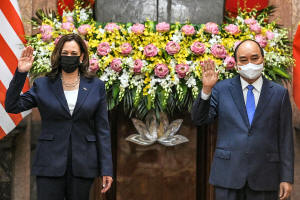U.S., China accuse each other of 'bullying' nations
 Send a link to a friend
Send a link to a friend
 [August 25, 2021]
By Nandita Bose and James Pearson [August 25, 2021]
By Nandita Bose and James Pearson
HANOI (Reuters) -U.S. Vice President Kamala
Harris on Wednesday again charged China with bullying its Southeast
Asian neighbours, the second time in two days she has attacked Beijing
during a regional visit, as Washington tries to rally regional partners
to take on China's growing economic and military influence.
The Chinese foreign ministry shot back on Wednesday and accused the U.S.
of meddling in regional affairs and disrupting peace. Earlier in the
day, Chinese state media accused Harris of seeking to drive a wedge
between China and Southeast Asian nations with comments in Singapore
that Beijing used coercion and intimidation to back its unlawful South
China Sea claims.
Speaking in Hanoi on Wednesday, Harris said there was a need to mount
pressure on China over its maritime claims and offered to support
Vietnam in several key areas, including enhancement of maritime security
to take on Beijing's increasing assertiveness in the South China Sea.
"We need to find ways to pressure, raise the pressure…on Beijing to
abide by the United Nations Convention on the Law of the Sea, and to
challenge, its bullying and excessive maritime claims," said Harris
during a meeting with Vietnamese President Nguyen Xuan Phuc.
Harris offered Vietnam more visits by U.S. warships and aircraft
carriers, vaccines and aid to tackle COVID-19 and announced the launch
of several programs to help combat climate change, according to a White
House official who did not wish to be named.

Harris's seven-day trip to Singapore and Vietnam is part of a broader
U.S. strategy to take on China globally. China, Vietnam, Brunei,
Malaysia, the Philippines and Taiwan lay claim to parts of the disputed
waters of the South China Sea, which is crossed by vital shipping lanes
and contains gas fields and rich fishing grounds.
China has established military outposts on artificial islands in the
South China Sea and objects to foreign warships sailing through what it
claims is its sovereign waters.
The U.S. Navy regularly conducts "freedom of navigation" operations
through the disputed waters, which China objects to, saying they do not
help promote peace or stability. In 2016, the Hague-based Permanent
Court of Arbitration ruled against China's claim, but Beijing has
rejected the ruling.
"While pointing a finger at China and accusing it of 'coercion' and
'intimidation', Harris wilfully ignored her own hypocrisy in attempting
to coerce and intimidate regional countries to join Washington in its
scheme to contain China," the state run China Daily said in an editorial
responding to Harris's comments in Singapore.
Harris's Singapore speech was a baseless attack on China, the editorial
said.
"It seems that the United States' only commitment to Southeast Asia is
its dedicated efforts to drive a wedge between the Southeast Asian
nations and China," it added.
[to top of second column]
|

U.S. Vice President Kamala Harris (L) and Vietnam's President Nguyen
Xuan Phuc pose for a photograph in the Presidential palace in Hanoi
August 25, 2021. Manan Vatsyayana/Pool via REUTERS

The U.S. administration has called rivalry with China
"the biggest geopolitical test" of the century as it cements its
pivot towards Asia. Southeast Asia has seen a series of high-profile
visits by top administration officials, including Secretary of
Defense Lloyd Austin, who visited Hanoi in late July.
Harris's arrival in Hanoi was delayed on Tuesday after the
U.S. Embassy in Vietnam said it had detected an "anomalous health
incident", potentially related to the mysterious Havana Syndrome.
During the delay, Vietnam's Prime Minister Pham Minh Chinh and
China's ambassador to Vietnam held a previously unannounced meeting,
during which Chinh said Vietnam does not take sides in foreign
policy. The Chinese ambassador promised a donation of 2 million
COVID-19 vaccines during the meeting.
China is Vietnam's largest trading partner and Vietnam is heavily
reliant on materials and equipment from China for its manufacturing
activities.
Their ruling Communist Parties maintain close ties, but Vietnam and
China have been embroiled in a longstanding dispute over maritime
claims in the South China Sea.
The tensions have propelled Vietnam into being one of the most vocal
opponents of Beijing's claims in the disputed waterway and Hanoi has
received U.S. military hardware, including coastguard cutters.
On Wednesday, Harris offered the deployment of a third U.S. Coast
Guard cutter, a fleet of 24 patrol boats, base facilities, piers,
law enforcement training and other joint activities that help
Vietnam bolster its maritime security.
Ties between Hanoi and Washington have grown closer more than four
decades after the Vietnam War ended in 1975, and Vietnam has quietly
endorsed the U.S. Indo-Pacific strategy because it takes a hard line
against China in the disputed waters.
Analysts say Vietnam wants to upgrade its diplomatic relationship
with the United States to a "strategic partnership" but is concerned
such a move would anger Beijing.
(Reporting by Nandita Bose and James Pearson in Hanoi and David
Stanway in Shanghai; Editing by Michael Perry and Bernadette Baum)

[© 2021 Thomson Reuters. All rights
reserved.] Copyright 2021 Reuters. All rights reserved. This material may not be published,
broadcast, rewritten or redistributed.
Thompson Reuters is solely responsible for this content. |